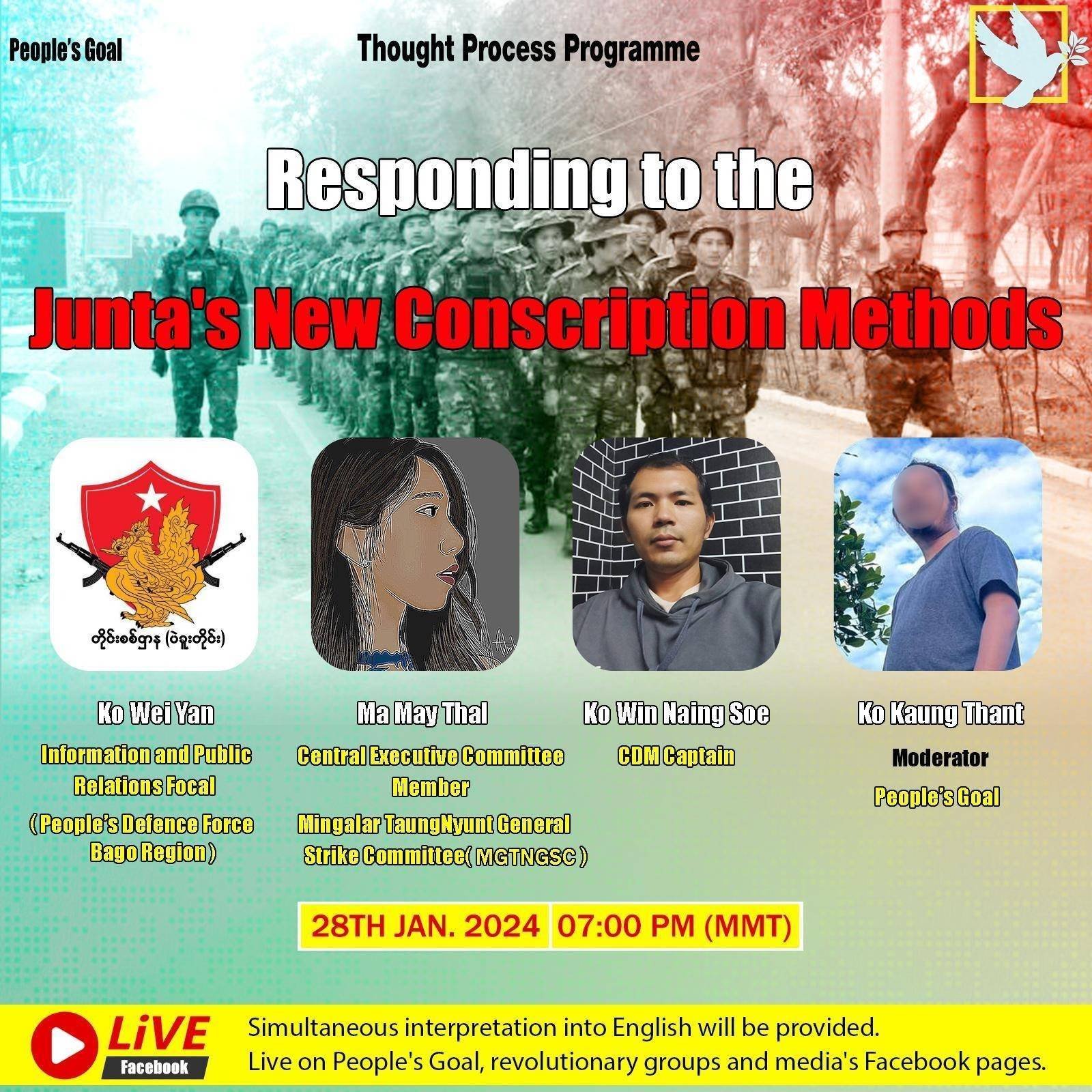Responding to the Junta's New Conscription Methods January 28, 2024
Q. The junta is trying to strengthen its militias. How do you think this will impact the Bago region?
Ko Wei Yan (Information and Public Relations Focal, People's Defense Force, Bago): This is really happening in Bago. It is related to corruption and tension inside the military. They are getting weaker and turning to informal militias to help them. The Bago region has an eastern part and a western part. The east shares a border with the KNU territories, and it is hard for the junta to assert control there. In the west, however, they have stepped up their forced youth recruitment. If villages in the western part fail to provide young soldiers, the community will be fined 2–3 million kyats. We have to be careful and keep an eye on how this situation will develop. We cannot ignore it. We need to know how many recruits they get.
Q. Min Aung Hlaing has publicly encouraged people to join militias. What do you think the impact of this discourse will be?
Ma May Thal (Central Executive Committee Member, Mingalar Taung Nyunt General Strike Committee): Indeed, the fascist leader and his political cronies had a meeting on Jan. 6 in which they discussed their planned election as well as a militia strategy. After three years of revolution, they have grown weak and lost towns and bases. They need to replenish. They are trying to form militias in regions with strong revolutionary movements—e.g., Bago and Sagaing. This puts the civilian population at even more risk of violence. For a long time, the SAC has been unable to get recruits, so they have had to rely on criminals to fill their ranks. They also use con men to persuade people to join them through false promises of reward. They then enslave them as porters.
Now, the revolution is at a high point, and the SAC suffers daily losses. Therefore, they are desperate to bolster themselves with local militias. The people in affected regions need to be aware of the danger and take preventative measures. Local militias will be used to provide security for inspecting officers. They will also be used for extrajudicial killings and to make arbitrary arrests for money. They are essentially using people as hostages and inflicting more suffering.
Q. How is the recruiting being done? What are the consequences?
Ko Win Naing Soe (CDM Captain): This revolution is not just a war. It is about systematically eliminating the military dictatorship. They always say they are fighting "insurgencies." There are some semi-loyal ethnic armed organizations, which I had to work with when I was in the military. They are at least supported by the military, opportunistically. There are several such groups in the Bago area. The primary role of pro-military militias is to collect intelligence for the military against the people. They speak the local language and the lay of the land. There are also weaponized militias, depending on how much the military trusts the group.
The revolutionary forces have recently gained the upper hand, so they need militias more than ever. However, there is very little trust between the military and the militias. They have sacrificed hundreds of militiamen to fight for the interests of Min Aung Hlaing and the generals. Some militia groups have declared that they will not help the military but will only work to protect the local people from all threats.
Q. What can people do to prevent being recruited?
Ko Wei Yan: Revolutionary forces need to engage with people on the ground. The people must know that they are actively working for them. There is very little trust between the military and the militias. I heard a recent report that the military only has about 30% trust in its uniformed militias. There is virtually no trust in the less formal militias. There are many PDFs that are not part of a unified revolutionary army. Many of them are only set up to establish local security. These PDFs must be aware of the dynamics of the pro-military militias and counteract them. This will prevent the militias from being effective. In general, Bago people despise the military. Nobody wants to see the army anymore. It is a matter of mobilizing the people.
Q. How can we minimize conflict between the People's Defense Forces and the pro-military militias?
Ko Wei Yan: The revolutionary leaders are well-informed about the dynamics of their areas. Thus, I am not too worried about revolutionary forces having intensive conflicts with local militias.
Q. Is recruitment being done directly by the army or militias themselves?
Ko Wei Yan: It depends on the area. In some areas, there are groups that are truly loyal or corrupt enough to do direct recruitment. In other areas with weaker support, the recruitment is done by the army. Some village heads might participate in forced recruitment. In other areas, they do not participate.
Q. What does the public need to know about militia recruitment?
Ma May Thal: A compulsory military service law was drafted in 2015, but only now are they talking about implementing it. If this goes into effect, it will be tough for Myanmar people to avoid conscription. The fact that they are forcibly recruiting for militias shows that they are serious about forcing people to work for them. The people of Myanmar have been committed to opposing the military since the coup. If nationwide forced recruitment happens, I am confident the people will resist it. Nobody wants to serve this oppressive military. Revolutionary organizations should explicitly guide the people in the steps they should take if they face forced recruitment. Strategies must be developed, and channels must be kept open in preparation for this. People on the ground must know what their options are. Unicef and UN agencies might help, but these channels must be developed. Thus, the role of the media is crucial. Infographics and step-by-step guides will help people access safety and aid. When one person is forcibly recruited, the whole society is affected.
Ko Win Naing Soe: Revolutionary forces need to know the local dynamics and communicate the military's forced recruitment activities to the rest of the world. There are also several cases of pro-military militias losing faith in the military and joining the revolutionary forces. We need to encourage more of these defections. The military is losing many territories and bases. They are steadily weakening and so are very serious about forced recruitment. Therefore, the revolutionary forces must out-recruit them.
The military is not supported by the people. So whenever they enter a village, people say, "The enemies are here!" The people have come to understand that the soldiers only protect the interests of the military bosses. It is understood that they only want to use the militias to control the people. Even groups that are supposedly pro-military are not properly trained, and if they are sent to battle, they have no chance in a fight and get killed. When a soldier gets killed, it is a huge hassle for the officers to replace them. That is why they are using forced recruits.
This revolution is not about killing those soldiers. It is about ending the dictatorship.
Q. What if the militias end up defecting? Wouldn't this put the military at huge risk? How are they preparing for this possibility?
Ko Win Naing Soe: Attitude is everything. They will arm who they can trust based on the person's pro-military attitude. But they do not have the capacity to oversee all of this right now. They have few resources to manage everyone. Therefore, strict oversight is unlikely. The best they can do is to try to gather information about the people. It will be a hard decision for them to arm a militia. They have lost whole battalions and platoons already. Most soldiers must return their guns to the storerooms as soon as they return to base. Even officers are not allowed to carry guns all the time.
Audience Comments and Questions:
—We cannot assume that forced recruits will defect. It is not that easy. The military's propaganda is so intense. They use religion and nationality to brainwash people. The revolution must engage in counterpropaganda, but they seem to have little interest in this kind of work.
—How can we contribute?
A: Cultivate a network and share information so that as many people as possible know what is happening.
CLOSING REMARKS
Ma May Thal: We must share more information with people on the ground. Our revolutionary side has not done enough to prepare the people; nor has the media. We must educate and raise awareness.
Ko Wei Yan: The most important thing is to have an open flow of information. We request people to share and network between townships.
Ko Win Naing Soe: People need to be aware of the military's forced recruitment activities. If people are recruited, I hope they can still defect to the revolution.


